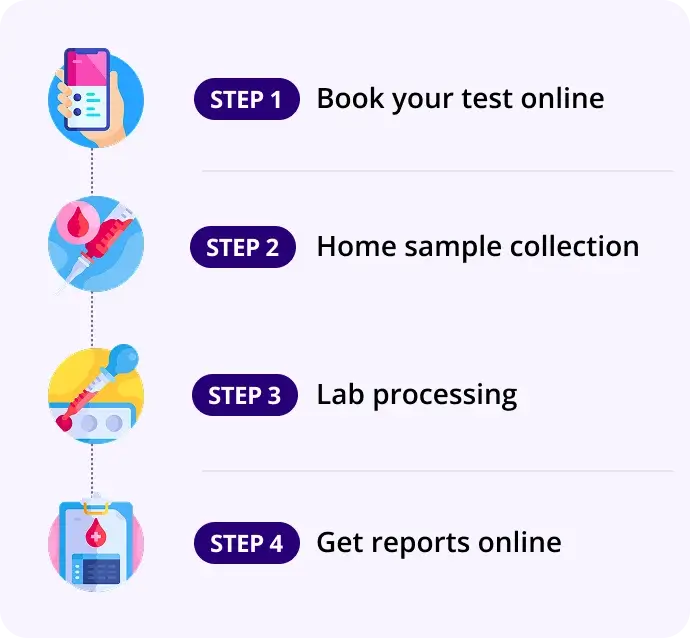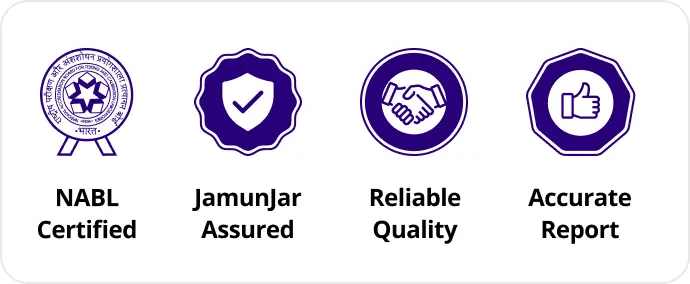Search for
Hepatitis B Envelope Antigen (HBeAg)
Liver
Report in 4Hrs
At Home
No Fasting Required
Details
It indicates high levels of viral replication and infectivity in individuals with chronic or acute hepatitis B
₹399₹825
52% OFF
FREE:
Ai Insights
Hepatitis B Envelope Antigen (HBeAg) - Comprehensive Medical Test Guide
- Why is it done?
- Test Overview: HBeAg measures the presence of hepatitis B envelope antigen, a protein produced by hepatitis B virus (HBV). This test indicates active viral replication and infectivity levels in the blood.
- Detection of Active Infection: To confirm active hepatitis B infection and distinguish it from past infection or immunity.
- Assessment of Infectivity: To determine the contagiousness of an infected individual; HBeAg positive patients have higher viral loads and greater transmission risk.
- Diagnosis of HBV: Part of the diagnostic panel for patients with suspected hepatitis B, acute hepatitis symptoms, or abnormal liver function tests.
- Monitoring Treatment Response: To assess response to antiviral therapy; HBeAg seroconversion (becoming HBeAg negative) indicates treatment success.
- Screening in High-Risk Populations: Routine screening for healthcare workers, blood donors, pregnant women, and individuals exposed to HBV.
- Chronic HBV Management: Periodic monitoring in patients with chronic hepatitis B to determine disease progression and need for treatment initiation.
- Normal Range
- Normal Result: HBeAg Negative or Undetectable
- Units of Measurement: Qualitative test reported as Positive or Negative; can also be reported in protein equivalents units (PEU/mL) or milliunits per milliliter (mIU/mL) for quantitative assays.
- Reference Range: Negative (< 1.0 cutoff ratio or < detection limit); Cut-off values vary by laboratory, typically < 1.0 for qualitative assays.
- Abnormal Result: HBeAg Positive or Detected (≥ 1.0 cutoff ratio); Indicates active HBV replication and higher infectivity.
- Negative Result Significance: Absence of HBeAg suggests lower viral load, reduced infectivity, or resolved infection; may indicate immune control of virus.
- Positive Result Significance: Presence of HBeAg indicates active viral replication, high infectivity, and greater risk of transmitting HBV to others.
- Interpretation
- HBeAg Negative Results: Indicates lower risk of transmission, possible immune control of infection, or resolved disease. May occur in chronic HBV carriers with controlled viral replication or in acute hepatitis recovery phase.
- HBeAg Positive Results: Indicates active HBV replication, high viral load (usually > 105 copies/mL), and high infectivity. Seen in acute hepatitis B or chronic infection with active replication phase.
- HBeAg in Clinical Context: Must be interpreted alongside HBsAg (Hepatitis B surface antigen), HBeAb (HBe antibody), and HBV DNA levels to accurately assess infection status and stage of disease.
- Seroconversion: HBeAg seroconversion (transition from HBeAg positive to negative with appearance of HBeAb) is a favorable prognostic marker indicating viral suppression or treatment response.
- Factors Affecting Results: Antiviral therapy (nucleos(t)ide analogs or interferon), natural immune response, HBV genotype variations, mutations in the precore region, and disease stage significantly influence HBeAg status.
- HBeAg Negative Chronic Hepatitis B: Subset of patients may have detectable HBV DNA despite HBeAg negativity, indicating ongoing viral replication and potential for disease progression.
- Clinical Implications: HBeAg positivity correlates with disease severity, risk of cirrhosis development, hepatocellular carcinoma risk, and treatment recommendations.
- Associated Organs
- Primary Organ: Liver - HBV specifically targets and replicates within hepatocytes, causing inflammation and hepatic damage.
- Hepatitis B and Acute Hepatitis: HBeAg positive in acute hepatitis indicates active viral replication phase with potential fulminant hepatic failure in severe cases.
- Chronic Hepatitis B: Persistent HBeAg positivity associated with chronic active hepatitis, progressive fibrosis, and accelerated progression to cirrhosis.
- Cirrhosis: HBeAg positive status increases risk of developing hepatic cirrhosis with HBV DNA levels and HBeAg status used to predict cirrhosis risk.
- Hepatocellular Carcinoma (HCC): Persistent HBeAg positivity significantly increases HCC risk; HBeAg status is a prognostic marker for HCC development in chronic HBV patients.
- Hepatic Fibrosis: HBeAg positive chronic carriers have higher rates of progressive fibrosis compared to HBeAg negative carriers with lower viral replication.
- Associated Conditions: Fulminant hepatic failure (acute), hepatic decompensation, portal hypertension, variceal bleeding, and end-stage liver disease (ESLD) can result from HBeAg positive chronic infection.
- Extrahepatic Manifestations: HBeAg positive status may be associated with immune-mediated conditions such as polyarteritis nodosa, glomerulonephritis, and cryoglobulinemia.
- Transmission Risk: HBeAg positive patients have 60-90% transmission risk during unprotected sexual contact and mother-to-child transmission, affecting multiple organ systems in infected individuals.
- Follow-up Tests
- HBV DNA Level (Viral Load): Essential follow-up test; quantifies viral replication burden; helps determine need for treatment and predicts disease progression.
- HBsAg (Hepatitis B Surface Antigen): Markers of HBV infection; persistence of HBsAg defines chronic infection; absence indicates resolution of infection.
- HBeAb (Hepatitis B e Antibody): Appears after HBeAg clearance; presence with HBeAg negativity indicates immune response and lower infectivity.
- HBcAb (Hepatitis B Core Antibody): Indicates past or present HBV infection; IgM HBcAb suggests acute infection; IgG indicates chronic or resolved infection.
- Liver Function Tests (LFTs): Include ALT, AST, bilirubin, albumin; assess degree of hepatic inflammation and damage; baseline establishment and periodic monitoring essential.
- Liver Ultrasound: Imaging assessment for cirrhosis, portal hypertension, hepatomegaly, and HCC screening in HBeAg positive patients with advanced disease.
- Transient Elastography (FibroScan): Non-invasive assessment of liver fibrosis degree; valuable for staging chronic HBV disease and monitoring response to therapy.
- Alpha-fetoprotein (AFP): Biomarker for HCC risk; elevated levels suggest HCC development; recommended every 6 months in high-risk patients.
- Liver Biopsy: Definitive assessment of hepatic inflammation and fibrosis; considered when non-invasive markers are inconclusive or treatment decisions uncertain.
- HBV Genotyping: Identifies HBV genotype (A-I); important for predicting response to interferon therapy and informing treatment selection.
- Antiviral Resistance Testing: Performed when HBV DNA remains detectable on antiviral therapy; identifies resistance mutations and guides therapy modification.
- Monitoring Frequency: HBeAg positive untreated chronic HBV: HBV DNA and liver function tests every 3-6 months; annual ultrasound and AFP; during treatment: more frequent monitoring; post-treatment: periodic surveillance for disease activity.
- Fasting Required?
- Fasting Status: No - Fasting is NOT required for HBeAg testing.
- Blood Draw Specifications: Venipuncture for serum sample; standard blood collection tube (usually red-top or SST); no special collection requirements.
- Pre-Test Preparation: No special preparation required; eat and drink normally; take medications as prescribed unless otherwise instructed by physician.
- Medications: No medications need to be withheld; antiviral therapy should continue as prescribed; lab results unaffected by most medications.
- Sample Storage: Serum should be separated and processed within 24 hours; refrigerate if delayed; frozen storage at -20°C or colder acceptable for long-term storage.
- Timing Considerations: Test can be performed at any time of day; early morning collection no more advantageous than afternoon; avoid immediately after strenuous exercise if possible.
- Additional Instructions: Wear comfortable clothing for easy blood draw access; remain calm during collection; inform phlebotomist of any needle anxiety; adequate hydration recommended.
How our test process works!

